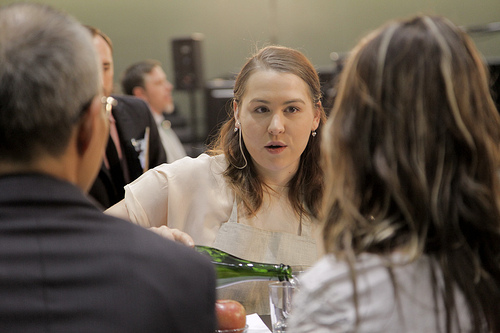The Scoop on Barista Competitions with 2012 USBC Champ Katie Carguilo
By Katie Carguilo, Counter Culture Coffee, New York, NY
So, you want to compete in a barista competition. Congratulations! For 15 minutes your excellent coffee skills and your ability to create a great experience for a panel of judges is going to shine! The industry needs more baristas like you: baristas so committed to their craft they are willing to put their ideas and skills up for critique, so thank you for taking this on. It's going to be a lot of work, but it's totally worth it, I promise. Here's what you can expect to happen over the next few months:
1. To spend a lot of time (and money!) preparing. The competition menu (each barista makes a set of espressos, cappuccinos and signature beverages, describes their flavors and the intention behind how they have chosen to serve them), does not mimic the way drinks are normally served in a busy cafe. There's the whole presentation element and time is of the essence. To make sure you are able to make and communicate everything smoothly, you're going to have to try out some different techniques and practice the whole thing a couple (dozen) times through. On top of that your judges are looking for you to provide them with a culinary experience which means your set has to be cohesive (wares shopping!) and your signature drink has to be delicious (ingredients shopping!). I hope you like Crate & Barrel, Amazon.com and drinking lots of espresso in the evenings!
2. To make new friends! All those hours your spent practicing were probably done with your colleagues that have either competed before or are interested in the process. And when the weekend finally rolls around, everyone cramped together around in the prep room and around one dishwashing sink, you're bound to get to know (and love!) some of your fellow competitors. Odds are the person next to you has great taste in music, interesting thoughts about coffee quality and service paradigms, and hopefully a flask of barrel-aged whiskey or a Hario kettle full of negronis. Whatever the case, you want to know this person. Become their friend and maybe they will let you sleep on their couch the next time you're visiting their town.
3. To receive inconsistent feedback from judges. Real talk: judges are human. As much work as they do in calibration, there's always going to be a subjective element to competition. Mostly this is going to show up in your signature beverage and overall impression scores: they're pretty calibrated on espressos and cappuccinos. Plus, let's be honest, your coffee and your presentation is going to differ round to round. All of this is gong to add up to different scores and impressions from different panels of judges. All you can do is your best to be consistent: put together a routine that focuses on an aspect of coffee that you are excited about, practice so that you can make consistently delicious beverages under any circumstance, and then let it go. If your scores are less than what you expected you can be disappointed and you should ask for clarity, but having bad attitude about it reflects poorly on no one but yourself.
4. To be a better barista than you were when you started. This one should really be #1 because this is the whole point of the competition. It gives baristas (and the roasters and the growers that work with them) a tangible reason to work on their skills to produce the best cup of coffee and deliver the best customer experience possible. If making that happen isn't your primary goal, you're doing it wrong.
Some tips:
- Watch other competitors. Other people have great routines too. Don't have your head so far in your game that you can't appreciate what else is going on out there.
- Don't expect to win your first time. Have another goal, like not going over time or meeting someone in the industry you haven't met before. That way you won't necessarily be disappointed if you don't achieve your primary goal of taking home the gold. That said, there's no point in competing unless you're really going to have a go, so there's nothing wrong with being in it to win it. Just remember to have fun.
- Arrive a day early so you can start unpacking and polishing (you will be surprised how long this takes), and don't plan on checking out of the hotel or leaving until the day after. There's no time to deal with that the day of finals, whether you make it or not.
- Have all your hairstyles planned. The year I won I brought a hairstylist with me to Portland. Well, in reality my best friend Janet who happens to be a hairstylist wanted to go to Portland and I told her she could stay in my hotel room and she offered to do my hair. But that just may have been the tipping point, so this is my pearl of wisdom I pass on to you.

